|
|
The Riverbend Down Syndrome Association is a 501(c)(3) non-profit organization and can receive tax deductible contributions. Our Employer Identification Number is: 14-1982424.
4th Annual Puttin' For Down Syndrome by Tim Nienhaus.
The 4th Annual Puttin' For Down Syndrome charity event was held on Friday, September 26 at Clinton Hill Golf Course. There were 104 golfers that attended the event along with 5 kids with Down syndrome in the free golf clinic. The day was beautiful and the event went very well raising about $10,000 to be donated between Saint Louis Children's Hospital and the Down Syndrome Association of Greater St. Louis. Emmanuel Bishop, 11 years old, started the event off with the ceremonial first drive. He is a silver medalist in golf at the Special Olympics Fall Festival. During the golf tournament, 5 kids spent an hour learning to hit the golf ball with owner and professional Dan Polites. They had a tremendous time as evidenced by the smiles on not only their faces, but on the faces of their parents. We finished the day bringing everyone together for dinner and a silent auction. Throughout the day the 12 volunteers not only made the day for the participants go well, but enjoyed participating in the final dinner and auction.
 |
| "A" flight winners: Kenny Zika, Steve Zika, Brian Earls, and Steve Brooks.
|
|
 |
In Memoriam
†
This newsletter issue is dedicated to Caleb Michael Mayfield.
Born: August 22, 2008, 4 pounds, 12 ounces, 16 inches long.
Proud parents: Mark and Elizabeth
Proud siblings: Joshua and Jenna
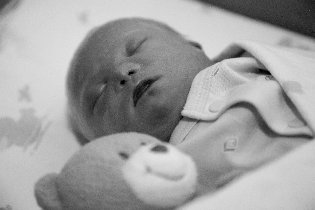 |
| "The only thing he felt was love" |
Local Events
3rd Annual Scotch Doubles Bowling Tournament for Down Syndrome Awareness. Silent Auction, door prizes and 50/50 drawings at each session.
When: Saturday October 25
Where: Tri-County Bowl, Jerseyville
$20 a couple early registration, contact Eric and Joy Stemmler for more details or to register.
|
|
|
September 21st Get Together
 |
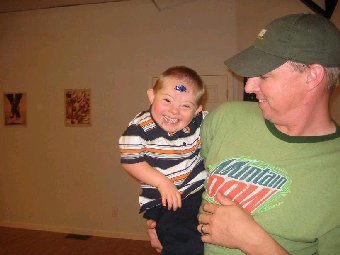 |
Family group picture at Turner's Tumbling
|
Eric Rodgers with son Parker |
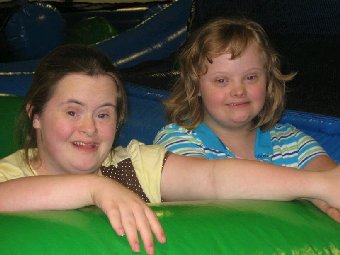 |
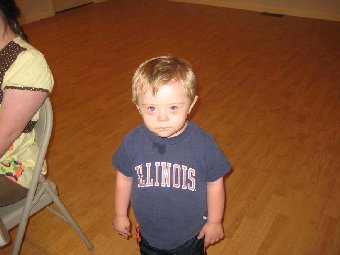 |
Cassie Scott & Katie Stemmler
|
Jacob Lakin |
 |
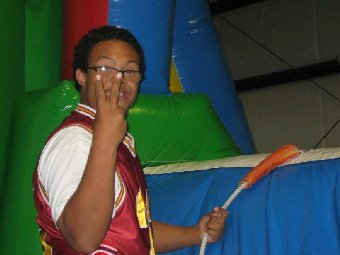 |
Eric Stemmler overseeing slide activities
|
Kamali Mitchell |
Down Syndrome Articles
Let's change our focus regarding Down syndrome by David M. Perry. E-mail: dperry@dom.edu. October 4, 2008. Star Tribune, Minneapolis-St. Paul, A13. © 2008 Star Tribune. All rights reserved. Reprinted with the permission of the author.
The constructive debate isn't about bringing such children into the world, but about helping them, and their parents, make their way in the world.
I love seeing Trig Palin's beautiful face on my television. He brings sweetness to an otherwise harsh political season. As a father of a boy with Down syndrome, I hoped that Trig's sudden appearance in the national limelight might bring hope both to families like mine and especially to those just learning that their future child has Down syndrome. But it hasn't turned out that way.
We all know the story of Trig's mother, how in her 40s, she received a prenatal diagnosis of Down syndrome and chose to continue her pregnancy. A lot of people don't make that choice. Right now, 80 to 90 percent of those who learn that their unborn child has Down syndrome terminate the pregnancy. This percentage is shocking. It shows that this isn't a political or religious issue — it shows that people, all kinds of people, are afraid.
I understand those fears. When our nurse-midwife said "Down syndrome" to me, my thoughts spun into despair and confusion. My mind raced with dark questions about his quality of life, our quality of life, consequences for future children and much more. Then I had to tell my wife. I can't imagine living in that state of unhappy confusion for months, waiting for my special-needs child to be born. Thankfully, we didn't have to. An hour after the diagnosis, our tears had stopped and we had a baby to feed, clean and love. He lifted us out of that darkness and now fills our life with more joy than we ever imagined. But I've never forgotten our first hour, and I think I know how to help people facing those same fears.
Like my son, Trig helps naturally. His sweet face counters the fear that comes from the dreadful diagnosis, but more is needed than great photo ops. Expectant parents need to know that, while raising a child with Down syndrome is challenging, the rewards are tremendous, and support can be found. But this isn't how Trig has been talked about since his mother was nominated. Instead, the conversation has focused on that singular moment when she chose not to have an abortion. That moment may demonstrate Sarah Palin's courage, her faith and her commitment to the prolife movement, but it doesn't help Trig, it doesn't help my family and, most of all, it doesn't help other expectant parents.
Choosing life is not about what happens in utero, but about what follows. Choosing life is about knowledge. It's about training doctors and nurses how to talk to expectant parents. Most of all, it's about providing an antidote to fear by changing the perception of disability. That's where Trig's voice, even before he learns to talk, needs to be heard. But his voice is being drowned out by the partisan hubbub of people from both parties who are focused on the single issue of abortion. Let's change, or at least expand, the message.
What I want is a serious national conversation about raising children with disabilities — the way that government, schools, churches, doctors, HMOs, and most of all friends and families can help us. My wife, son and I belong to three or four support groups, have four early intervention therapies a week in our home, go to a weekly group therapy and are about to start aquatic therapy. We have four doctors and will probably have more before too long. We've got thousands of challenges ahead of us — but what parent doesn't? Let's talk about the federal mandates that order, but do not fund, early intervention. Let's talk about universal health care and special education. Let's talk about how to help our children find meaningful lives as adults. Most of all, let's talk about ways to ensure that everyone sees people with Down syndrome as, first and foremost, just people. Then we can get to work on the syndrome.
David M. Perry, formerly of Macalester College in St. Paul, is an assistant professor of history at Dominican University in River Forest, IL 6030.. His 2-year old son, Nicholas, has Down syndrome.
We still don't know what 'normal' really is by Michael Bérubé. Toronto Globe and Mail, March, 4, 2007. Reprinted with the permission of the author.
In 1991, when my wife Janet was pregnant with our second child, we were told by her obstetrician that we might want to consider an amniocentesis - just to make sure.
"Just to make sure of what?" we asked. "We had a sonogram, and we imagine that any serious problems would have shown up there."
An amniocentesis would take genetic material from the fetus itself, the doctor explained, thus affording us a crystal-clear indication of any anomalies that might lead us to terminate the pregnancy.
Janet and I discussed the possibility that day, but we didn't discuss it for long. Janet pointed out that we wouldn't get the results until 16 to 18 weeks into the pregnancy and, though we both supported abortion rights, we did not want to wait until the second trimester before deciding to terminate — unless the fetus was very severely damaged. And something very severe, such as anencephaly, would have been spotted on the sonogram.
I added (because I'd just learned it from reading the brochure) that amniocentesis induces miscarriage in one of every 200 attempts. Curiously, at age 36, those were the same odds against Janet's having a child with Down syndrome.
"And what if we had a child with Down syndrome?" she asked. "Well, then," I said, uttering one of the more prescient and consequential sentences of my life, "we'd just love the baby all the more."
I guess it was a sweet thing to say, though in retrospect it was incredibly naive. Jamie Bérubé was born that September. He has Down syndrome. We love him dearly, and he delights us daily — not merely by being cute, but by being clever and sly and witty and charming and a good kid to his brother Nick.
But I didn't know anything about Down syndrome in 1991. I thought that people who had it were kind of flabby and passive and had a life expectancy in the 20s. I knew just enough — about disability and about my own heart — to make what I think was the right decision about prenatal screening.
I would make the same decision today, even more emphatically, but I would bring to that decision a deeper skepticism, born of both experience and study, about whether prenatal screening tells us everything we think we need to know.
Since 1991, people with Down syndrome have made — as the cliché has it — great strides. So has biomedicine. It is now possible, as I suggested in the book about Jamie I published in 1996, to do a definitive genetic analysis of a developing fetus as early as eight weeks. And it's possible to do so without sticking a great big fat needle into the uterus, as one does in amniocentesis.
Prospective parents who encounter the medical apparatus of prenatal screening today, then, are facing a world utterly unlike the one Janet and I inhabited 16 years ago: On the one hand, they can see happy and healthy children with Down syndrome all around them, being integrated into public life as never before; on the other hand, they can choose to screen for "genetic anomalies" (of which Down syndrome is by far the most prevalent) without fear of miscarriage and without the moral murk of a second-trimester abortion.
Many opponents of abortion rights, of course, do not understand why the moral murk should be any murkier in week 18 than in week eight. For them, life ("defects" or not) begins at conception and childbirth is mandatory. Yet even some opponents of abortion rights, together with most supporters, see moral shades of grey at every point in a pregnancy. They believe that some fetuses are more developed than others, and some fetuses are more disabled than others. Recognition of moral complexity in childbearing, in fact, can make for some strange alliances.
For example, as Rayna Rapp points out in Testing Women, Testing the Fetus, the ultra-orthodox Hasidim in New York are strenuous promotors of prenatal genetic screening because Tay-Sachs disease — a genetic disability so excruciatingly debilitating that it sometimes seems as if it were invented by bioethicists as an extreme limit case — occurs disproportionately often in Ashkenazi Jews
Surely, one would think, the eradication of Tay-Sachs would be an unqualified good for the species as a whole, not to mention the stricken parents who have to watch their child succumb to the disease. Surely it makes sense to screen for such things.
But does it make as much sense to screen for Down syndrome? Or for genetic markers that might indicate deafness, or cystic fibrosis, or Parkinson's Disease, or Huntington's, or Alzheimer's? Why should we try to detect relatively mild disabilities in utero — or degenerative diseases that may not appear for another 50 years?
The debate about prenatal screening has managed, remarkably, to obscure two critical things: We have no idea what we mean when we talk about "screening," and we have no idea what we mean when we think about "unqualified good for the species as a whole." And yet as the technology of prenatal screening improves with each year, we tell ourselves we're getting somewhere. How can that be?
Perhaps it's that we live in a world where an ounce of prevention is rightly considered to be better than a lifetime of symptomatic treatment — but where the logic of "prevention" is wrongly mapped onto pregnancy and childbirth, so that it perversely seems (to some people) as if it's always better to prevent some lives than to live them.
Or perhaps it's that we don't stop to consider all the things we can't see when we "screen" pregnancies. Things such as cerebral palsy or some forms of autism or schizophrenia or, my favorite term, "pervasive developmental delay" — a formal way of saying "we have no idea what's going on in there." Some advocates of across-the-board prenatal screening seem to be especially confused about what the technology can and can't do.
Or perhaps it's that we don't yet know how to distinguish disability from disease, ordinary fleshly frailty from relentless predatory illness.
That distinction was driven home to me last year when I taught the first graduate seminar in disability studies at Penn State University. My class was reading essays on the overlap between disability activism and gay/lesbian activism — an overlap concentrated on, but not exclusive to, the history of AIDS.
One of my students objected to the conflation of AIDS with disability in general. He understood, he said, why disability activists have resisted the idea that disability is something that can be "cured" or "prevented" with technological advances and medical interventions, just as gay and lesbian activists have resisted the idea that homosexuality is a curable disease.
He understood why people with congenital disabilities would recoil from a prenatal screening initiative whose assumptions seem to be that the world would be a better place if they had never been born.
But, he said, if a cure for AIDS were found tomorrow, would he be happy? If HIV could be wiped from the face of the Earth, would he support its eradication? Yes, yes he would. Without hesitation, without a second's misgiving.
The class took a collective breath. For weeks, we'd been reading the work of disability activists who argue, justifiably enough, that contemporary biomedicine frames everything in terms of the miracle cure — the scientific breakthrough that will allow the lame to walk and the blind to see. We'd read their scathing accounts of eugenics, the early pseudoscience of making better babies.
But in all that reading, we'd never come across a disability activist who calls for the creation of a Smallpox Restoration Society or a Polio Preservation League. The elimination of smallpox and polio (and tuberculosis and cholera and bubonic plague) seems to most people to be an unqualified good for the species. Even in the work of disability activists who would never give a moment's thought to providing all deaf people with cochlear implants, there is a common sense that there are some human conditions we are better off without.
But — and this is the critical point — deafness isn't one of them. Tay-Sachs is. Down syndrome, I submit, is not. So although it makes sense to screen for Tay-Sachs, it may not make sense to screen for far milder conditions. For that matter, there are innumerable contexts in which deafness is not a disability at all. In places where everyone is fluent in sign language, it's is just another name for a linguistic minority.
It's true that most people — between 80 and 90 per cent — who screen for Down syndrome will terminate the pregnancy if the results are "positive." I wish this weren't so, but I don't believe I should try to realize that wish by outlawing either abortion or prenatal screening. I believe I should try, instead, to persuade others that the possible eradication of Down syndrome just isn't something our species has achieved, or should achieve, any consensus about.
I didn't think it was worth it to screen for Down syndrome when Janet was pregnant in 1991. And back then I didn't have any idea that our "disabled" child would go on to learn elementary French or the characteristics of 40 different species of sharks. I didn't dream that he'd be such a capable swimmer and basketball player, or such an enthusiastic fan of Harry Potter.
Now that I know what Jamie is like, I've come to the conclusion that our fear of mental retardation is out of all proportion to the phenomenon itself, and that millions of "developmentally delayed" people can live happy and fulfilling lives — far happier and more fulfilling than most of us "normal" and "gifted" folk have been able to imagine.
Occasionally, I run into parents of children with Down syndrome who are quite certain that no one should ever be able to make prenatal decisions with which they themselves would disagree. In the United States, for instance, conservative pundit George Will has recently written that the legalization of abortion, combined with prenatal screening, has led society on "search-and-destroy missions" meant to rid the world of people like his son Jon. "Without this combination of diagnostic advances and moral regression, there would be more people like Jon, and the world would be a sweeter place."
Perhaps. And perhaps the world would be a sweeter place if we acknowledged that prospective parents who choose not to bring pregnancies to term are actually making difficult moral decisions rather than engaging in "moral regression." That way, we could try to persuade people not to abort fetuses with Down syndrome — or any other disability — rather than coercing them into mandatory childbirth regardless of the circumstances.
But the world is not a sweet place, and it has only recently — fitfully at that — attempted to provide meaningful accommodation for people with disabilities. Some of them, admittedly, require substantial assistance; others, like Jamie, are easier to accommodate socially than, say, a selfish, intemperate "normal" person. Some require nothing more than closed captioning; others require "job coaches" — if they manage to find work at all.
Indeed, as a society and as a species, we still don't seem to know what "normal" really is. We could think of the norm as (a) what's left over when we get rid of all the abnormalities, or (b) nothing more than the statistical mean in a fully inclusive society that incorporates every single one of us into public life to the greatest extent possible.
I prefer (b) myself, and I think you should too; but I worry that uncritical advocates of prenatal screening are thinking in terms of (a). Which leaves us with a bitter paradox — that even though we haven't begun to explore the ways in which we could include people with disabilities in our society, we devote precious time and resources to developing better ways of spotting them before they are born.
Eugenics and Down's Syndrome by Philip G. Ney, MD, MA, FRCP(C), FRANZCP, RPsych and Marie A. Peeters, MD. May 2000. Copyright © 2002 Dr. Philip G. Ney, All Rights Reserved.
Introduction
As society in general and medicine in particular lose the direction once provided by ancient morality in determining medical ethics, the void is being filled with a variety of arguments all of which, upon careful examination, are mostly sophistry in the interest of self. We must always be careful to avoid rationalizing thoughts that are basically hedonistic. Much of what passes for ethics are arguments of the haves against the have-nots.
Humans always must be able to face the crisis created by a helpless cry and come away having matured and reasoned for rather than against the desperate, poor and needy of society. If the human body neglects an infected toe the gangrene can quickly spread and the whole body die. History teaches us any civilization that neglects its undeserving citizens will eventually collapse. A priori, we have a skeptical attitude toward arguments that favour eugenics and the selective destruction of Down's Syndrome children. There is a reasonable alternative.
Arguments for and Against Eugenics for Down's Syndrome
- Poor quality of life. It is frequently argued that because these children are not fully capable of knowing and understanding they cannot possibly have a high quality of life. Because they have a poor quality of life, it is argued they should not have any life at all. The facts are that Down's Syndrome children do enjoy life. They smile frequently and bring joy to others. There are fewer suicides among handicapped people then there are among those without handicaps.
- Burden to the State. It is argued that the money that is spent on the continuing care for people with Down's Syndrome could be better spent on research and the provision of care for the rest of us. This usually meaning middle-aged people who want expensive medical treatment such as heart transplants. It is argued that Down's Syndrome children also interfere with their parents' pursuit of pleasure and fulfillment. The facts are that Down's Syndrome children have a lower per capita cost than most chronic disabilities. If a family is provided with occasional relief and a small maintenance most families are quite content to have the Down's Syndrome child live with them for they realize their special contribution. People with Down's Syndrome can also be taught to do piece work. Although not able to earn at standard union wages, they can work in well organized work shops and make enough money for their own keep. As will be pointed out, with modern educational, psychological and biochemical treatment, they can have near normal intelligence.
- Cannot contribute to society. It is argued that people with Down's Syndrome cannot make a meaningful contribution to society. This generally means not having a well paying job which allows them to become good consuming citizens and thus support a materialistic society. In fact, they make a whole variety of contributions of a non-material nature that will be discussed later.
- Improve the gene pool. It is argued that eugenics is necessary to improve the gene pool. Careful statistic analysis show that the selective diagnosis and destructive of Down's Syndrome children does not improve the gene pool. It may, in fact, worsen it. At the age of forty, a woman only has a one percent chance of having a Down's Syndrome child. The insistence that she has amniocentesis raises considerable stress. That stress can increase her level of estrogens and feminize both male and female offspring. There are many clinical examples of women who, with an uncertain diagnosis of Down's Syndrome, have aborted a totally healthy child and spent much of their lives in self recrimination.
- The Value of Down's Syndrome children. We hesitate to put forward the following arguments because we strongly believe every child has a right to exist and to be welcomed. However, Down's Syndrome children enrich society in many ways.
- Utilitarian arguments
- They teach us to be patient and loving. To stop and wait while they finish an activity give us an opportunity to observe small things more closely. They teach us gratitude for all the gifts that we are given. Because of their dependency, they teach us to be loving and caring. Without the dependency of needy people, our world would become careless and loveless.
- People with Down Syndrome have a different view of life. They seem to be able to detect the essential elements of life, and by their frankness and lack of social niceties they can cut through many formalities, disarm us from our prejudice and get to the heart of relationships. Jean Vanier, taking a person with Down's Syndrome to a wide beach in France, asked him to draw a picture of joy in the sand. This person responded, "the beach is not big enough."
- People with Down's Syndrome and other relatively helpless people force us to deal with our own helplessness. Sooner or later we must recognize that we all have handicaps and that we are all dying. The sooner we learn to deal with our helplessness, the better able we are to maximize our opportunities and utilize all our God given abilities and opportunities. Down's Syndrome children create a helpless cry like a kitten mewing on the rain soaked streets of a large city in the dead of night. We must deal with a crisis we would rather avoid. If we respond with nurture we grow. If we respond with aggression or neglect we begin to die, as does the kitten. A person with Down's Syndrome's inability to deal with many of the complexities of life forces us to decide to grow with them by nurturing their needs. If not, we die inside not able to hear their cry and respond to it, and thus not able to hear the cry of our own helplessness.
- Moral Arguments. Down's Syndrome children force us to question many of our cherished moral tenets such as the equality of all humankind. They force us to reevaluate, rethink and restate assumptions that must guide us in critical situations. People with Down's Syndrome force us to question the ethic of wantedness.
- Spiritual Arguments. People with Down's Syndrome point us to God. They help us to see ourselves as we really are. They help us to know God's mercy and love, for if God loves the weakest and poorest among us as much as he does us, then surely he will love us in our weakness and poverty. We need never be ashamed or afraid of it.
Progress in the Medical Management of Down's Syndrome
Dr. Marie Peeters discovered that Down's Syndrome patients being treated for Leukemia were very sensitive to methotrexate. This pointed to abnormalities in a variety of metabolic pathways. Since the children were not able to utilize or manufacture their own ingredients for normal brain metabolism, it has been found that to provide high doses of coenzymes or to bypass the defective pathways by adding an abundance of n-products can greatly improve the appearance and function of Down's Syndrome children. If folic acid is given from birth (±.5 milligrams per kilogram per day) it has been found that Down's Syndrome children are more active, concentrate better, have fewer infections, have fewer thyroid problems and have improved morphology, i.e., do not have protruding tongues. Folic acid, with or without vitamin B 12, plus infant stimulation (e.g., speech therapy) make it possible for many Down's Syndrome children to learn how to read and write and go to a normal school, at least until the age of seven.
Problems
The eugenic ethic is really a response to some deep underlying problems that humans have always had difficulty grappling with. These are;
- Denial. They would like to forget or ignore the fact that everyone is ignorant (lacking knowledge and insight), disabled (many mathematicians cannot carry a tune), dying (it is only a matter of time before aging overcomes regeneration) and mentally ill (we all do self-destructive things for subconscious reasons.
- The dichotomous division of continuous reality. The digital computer has helped us ignore the fact that almost every aspect of reality is continuous, e.g., weight, distance and radiation. We would like to convince ourselves that we are not one of those (e.g., dying), because we don't belong to the group in which we have placed them. We are not one of those (e.g., disabled), because they exist in a class we have created for them.
- There are supposedly limited resources. The life boat mentality is maintained for those arguing that Down's Syndrome use up precious resources and that their existence will mean that either the whole boat sinks or somebody else has to be thrown out.
- It has been widely taught and frequently believe that the first right of every child is to be wanted. This sentence is a death sentence for millions of handicapped and normal preborn people. To be alive because you are wanted is to be sentenced to a life of existential anxiety, survivor guilt, anxious attachments, ontological guilt, self doubt, distrust and the inhibition of expression to maintain pseudo-secrets. We do all of this in an effort to provide ourselves with a sense of security and immortality. The net effect is that it alienates and destroys many people upon whom we depend.
The Solution
We must face these false securities and deal with the underlying dilemmas. We must drop the denial for we are always one of them, whatever category they may be assigned to. We must measure things on an analog scale, recognizing we are different only in some degree. We must recognize that there is no limit to resources. The universe is boundless and, as far as we know, expanding with room and resources for all, were we courageous enough to colonize the stars. We must recognize that everyone must be welcomed. Because they are welcomed they are worthy and not vice-versa. When they are worthy they have a self-worth that they pass onto others and to the world. Thus they look after each other and the world in which we live.
Basic Tenets
- We believe that Truth is unitary. There cannot be a division between science and ethics, otherwise there will be continuing conflict and no guidance provided for those who must make decisions daily about the existence of other people.
- We must learn from history, because if we do not we will repeat it. We must recognize that as we treat the most limiting infected part of the body for the benefit of the body, so we must care for those who are designated as the lowest and the poorest because they are part of us.
- We are all part of the bundle of life. What happens to others happens to us because we are intrinsically united.
- The Universal Ethic of Mutual Benefit reminds us that we cannot benefit at the expense of our neighbour. If it is not good for him it is certainly not good for us. If it is not good for a woman it is not good for a man. If it is not good for the unborn baby it is not good for the mother. Science basically supports this proposition
Web Wanderings
Anna and John J. Sie Foundation Commits $34 Million to Establish Colorado as the Worldwide Beacon for Research and Care. URL: http://www.uchsc.edu/som/news/GlobalResearchInstDowns.pdf
Aurora, Colo. (Sept. 22, 2008) – The new Linda Crnic Institute for Down Syndrome unveiled at the University of Colorado Denver's Anschutz Medical Campus will have the single research focus of eradicating the ill effects associated with Down syndrome and will be the first to comprehensively address basic research, clinical research and clinical care all under one umbrella. [...]
The Institute will aggressively recruit the best and brightest talent worldwide - both inside and outside the field of Down syndrome and is expected to grow into a $150 million organization within ten years with staff estimated at more than 160. [...]
Father's Journal
Shoehorn
We bought Emmanuel his third set of golf clubs because he was topping the balls, but since he insists on tying his shoelaces, we did not notice that his shoes were now two sizes too small.
|
|
"One of the focuses of the Linda Crnic Institute for Down syndrome is to better understand ways to improve the cognitive ability of people with Down syndrome. We are going to do that by chasing down the genes that are responsible for the problems with cognition that happen in children" said Dr. Mobley, executive director of the Institute.
"Through research and improved care, we can make it easier for them to go to school, make friends, have jobs, get married and ultimately live independently. We will help them live richer, fuller lives."







